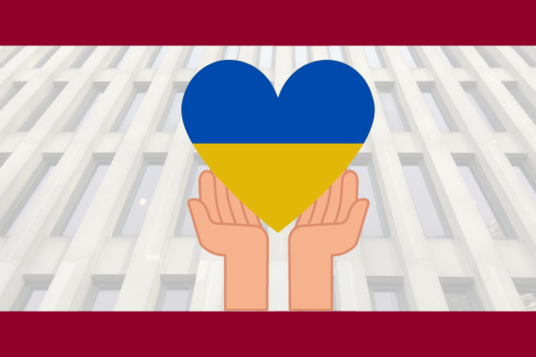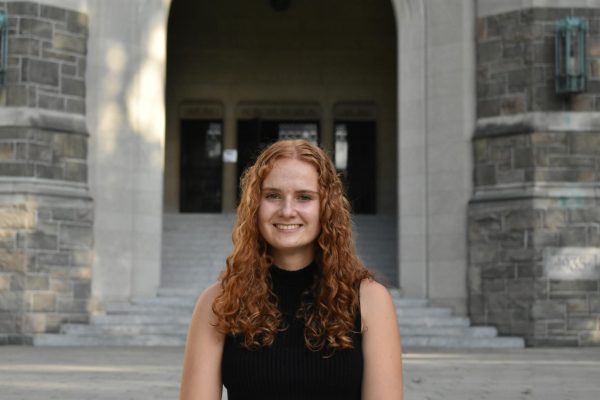Fordham Trustee Starts Fund to Support Ukrainian Students

Kim Bepler has started a fund for Fordham students affected by the crisis in Ukraine. (Courtesy of Fordham’s Website)
Kim Bepler, a Fordham trustee fellow, has recently begun a fund for Fordham students affected by the Ukrainian crisis. The fund, in which Bepler will match every donation made up to $50,000, is meant to help students who may be facing newfound difficulties because of the ongoing Ukrainian crisis. According to Bepler, the fund is an “unrestricted gift,” and the only requirement that students must meet is that their need is related to the crisis.
According to Bepler, the fund can go towards “helping [students] out with housing, food, clothing, whatever the need is. [Besides] demonstrating that [a student’s need] is because of the Ukraine crisis, there is no restriction beyond that.”
The fund’s online platform states that students seeking support should reach out to Brian Ghanoo, assistant vice president of the Office of Student Financial Services. Ghanoo will then work with the student to determine if their need is related to the Ukrainian crisis.
Bepler was first inspired to create the fund because of Fordham’s Center for Jewish Studies collaboration with The American Academy for Jewish Research and the New York Public Library which creates fellowship opportunities for individuals affected by the Ukrainian crisis. Fellows in this program will receive $5,000 stipends as well as remote access to research materials. In addition to the fellowship program, Bepler was struck by news coverage of Fordham’s Ukrainian student population.
“I’m someone that doesn’t sit idly by, and whatever small gestures I do, I’m an activist. I was online on the Fordham News site and I saw this extraordinary photograph of a Fordham student holding a Ukrainian flag. It just hit me that we have Ukrainian students at Fordham,” said Bepler.
According to Bepler, she worked closely with Roger Milici, vice president for development and university relations, to settle on creating a monetary fund.
Milici told Bepler that a fund would be “a really great idea” due to his knowledge that students had already reached out to the university for help because of their connections to the crisis.
The fund has helped the university address the financial issues that have occurred as a result of the conflict.
“The funds can’t fix everything, of course, but they can help to lessen the emotional and financial burdens on students,” said Robert Howe, assistant vice president for communications and special adviser to the president.The fund is also available to Russian students who have been affected by the crisis.
“I just wanted to make certain that when we set this fund up, while we were focusing on the Ukrainian crisis and were focusing on Ukraine students at Fordham, I wanted to make certain there was outreach to the Russian student population too,” said Bepler. “If they need counseling, they need someone to talk to, or they just want to be able to unite with their fellow Ukraine Fordham students, that’s something they could do.”
In addition to Bepler’s fund, the university has other processes in place to help affected students.
“Students are being cut off from the emotional and financial support of their families. It is important for the Fordham community to step up and be ‘men and women for others’ and help them through this crisis,” said Howe.
According to Howe, there is no typical protocol that the university follows when a crisis of the nature of the Ukrainian crisis affects students. In terms of financial aid, Howe explained that each student requesting help as a result of the Ukrainian crisis is being reviewed on a “case-by-case basis.”
Students affected by the Ukrainian crisis have not only been affected financially, but many have been unable to return home or have had to change their housing situations. University residential life has had to work with students to accommodate these unforeseen circumstances and changes.
“Residential Life has worked with a ‘handful’ of students, who had responded to Fordham’s offer to support affected students. We have made it possible for them to easily remain in housing due to travel complications,” said Charles Clency, assistant dean of students and director of Residential Life.
Like financial aid, Clency noted that students’ situations are being reviewed on a “case-by-case basis.” However, according to Clency, residential life is prepared to help students in any situations that may arise.
“It is important the students understand Residential Life is part of an university-wide joint effort to accommodate students facing these difficult circumstances, but our office stands ready and willing to do our part when called upon,” said Clency.

Isabel Danzis is a senior from Bethesda, Md. She is double majoring in journalism and digital technologies and emerging media. The Ram has been a very...






































































































































































































